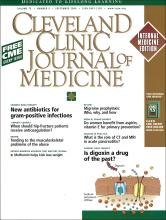ABSTRACT
Low-dose aspirin taken every other day helps prevent stroke in women aged 45 years and older, but does not prevent a first myocardial infarction (MI) or cardiovascular death among healthy women. Women receive no benefit from alternate-day vitamin E in the primary prevention of cardiovascular disease or cancer. These were the findings of the Women’s Health Study, in which investigators followed 39,876 female health professionals over 10 years. The women were randomized to receive either 100 mg of aspirin or a placebo tablet every other day; they were also randomized to take 600 IU of vitamin E or a placebo capsule on the intervening days. No statistically significant differences were seen between the aspirin and placebo groups in the primary cardiovascular end point, which was the combined number of nonfatal MIs, nonfatal strokes, and cardiovascular deaths. Analysis of secondary cardiovascular end points revealed that aspirin use was associated with no significant effect on the number of total MIs, fatal MIs, and nonfatal MIs, and a nonsignificant decrease in cardiovascular mortality. However, aspirin users did experience significantly fewer strokes, in particular ischemic strokes. Vitamin E had very little impact on the primary prevention of both cardiovascular events and cancer.
Footnotes
↵* Dr. Buring has received investigator-initiated research funding and support as Principal Investigator from the National Institutes of Health (the National Heart, Lung, and Blood Institute, the National Cancer Institute, and the National Institute of Aging) and Dow Corning Corporation; has received research support for pills and/or packaging from Bayer Health Care and the Natural Source Vitamin E Association; has received honoraria from Bayer for speaking engagements; and has served on a study’s external scientific advisory committee for Procter & Gamble.
- © 2006 The Cleveland Clinic Foundation. All Rights Reserved.






